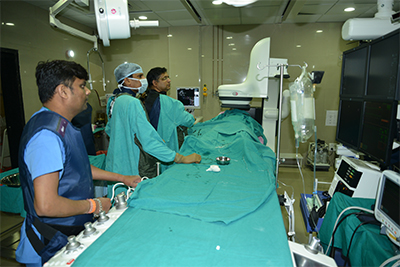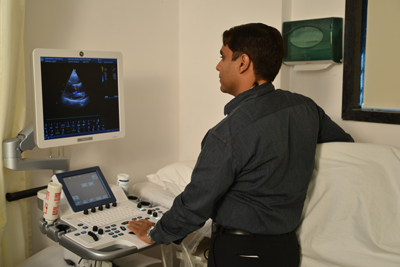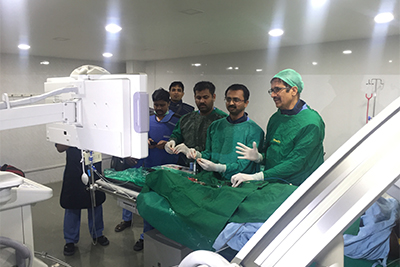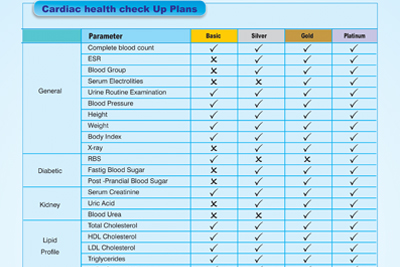

Invasive Procedures
Coronary Angiography
Primary Angioplasty
ASD, VSD & PDA Device Closure in Paediatric & Adult
View more
Non Invasive Procedures
ICCU Management & Critical Care
Super specialty Cardiac consultation
Tread Mill Test - Cardiac Stress test
View more
Other Invasive Procedures
EP Study & RF Ablation
Radiology Interventional procedures like Carotid Angiography & Stenting
View moreINVASIVE PROCEDURES
- Coronary Angiography
-
Coronary Angioplasty and Stenting (with/without IVUS-ROTABLATOR-DES etc.)
- Primary Angioplasty
-
ASD, VSD & PDA Device Closure in Paediatric & Adult
-
Cardiac Pacemaker Implantation – DDD / PPI
-
Balloon Valvuloplasty (Mitral / Pulmonary / Tricuspid /Aortic ,etc.)
- Pericardial Tapping
- Mesenteric Angiography
- Combo Device Implantation
- Cerebral AngioThrombolization
- Cerebral Aneurysm Coiling
- IVC Filter Implantation
-
Mesenteric Embolization etc. and many other Invasive Procedures.
OTHER INVASIVE PROCEDURES
- EP Study & RF Ablation
-
Radiology Interventional procedures like Carotid Angiography
- Cerebral Angiography & Stenting
- Cerebral Coiling
- Carotid and Renal Angiography
NON-INVASIVE MANAGEMENT / PROCEDURES
- ICCU Management & Critical Care
-
Well Equipped High Dependency Unit (HDU) with Central Monitoring System
-
Super specialty Cardiac consultation
-
2D Echo with color Doppler GE-VIVID T-8 Latest machine
- EECP (Extra Corporeal External Counter Pulsation)
- Tread Mill Test-Cardiac Stress test
- Adenosine and Dobutamine Stress Echo
- Trans Esophageal Echocardiography(TEE)
- Holter Monitoring
- 24 Hours Ambulatory BP Monitoring
- Central Aortic Pressure Monitoring
- Dedicated Dietitian Services
- 24×7 Cardiac Services
-
Specially Designed Cardiac Health Check-up Packages for all age group
- ECG (Electrocardiography)
- Physiotherapy

Cardiac surgery
CABG
Aortic Root Replacement & Enlargement
Repair Of Rupture Sinus Of Valsalva
Bilateral Femoral, Popliteal Embolectomy
View moreCardiac Surgery
- CABG
- Aortic Root Replacement & Enlargement
-
ASD Closure, Mitral Valve Repair, Tricuspid Valve Repair, Aortic Valve Replacement
- Repair Of Rupture Sinus Of Valsalva
- Sternal Wire Removal
- Bilateral Femoral, Popliteal Embolectomy
- Bilateral Varicose Veins Repair
-
Left Ventricular Aneurysm & Carotid Aneurysm Repair
- Carotid Endarterectomy
- Coarctation Of Aorta Package
- Exploration & Repair Of Artery
- PDA-Division (Patent Ductus Arteriosus)
- Pericardiectomy
- Pulmonary Embolectomy & Pulmonary Valvotomy

Health Checkup Plans
Health Checkup PlansWhat is Preventive Cardiology?
- Preventive Cardiology focuses on the identification and management of risk factors.
- People with risk factors are prone to cardiovascular events such as heartattacks, strokes, heart failure and sudden cardiac death.
- Even if people do not have apparent heart disease,modification of riskfactors is likely to lead to a longer life, free of heart attacks and other cardiovascular events.
-
Preventive Cardiology also provides a "maintenance check" for people with known heart problems,most often (but not always) involving blockages in the coronary arteries. To prevent additional cardiovascular events, these patients benefit from a thorough assessment of risk factors and their optimal modification.
-
In summary, patients without CAD will benefit from this program, and so will those with a history of CORONARY ARTERY DISEASE(CAD).
- What Are the Risk Factors for Cardiovascular Disease?
- High blood pressure
-
High cholesterol & other lipid abnormalities
- Diabetes
- Obesity
- Smoking
- Sleep apnea
- Lack of physical activity
- All of these factors are highly predictable and preventable causes of heartattack, stroke and sudden death...but prevention requires your action!
-
'Over 30 % of adults in India have high risk of developing heart attack'
-
As per a World Health Organization (WHO) report, cardiovascular diseases(CVDs) would be the largest cause of death and disability in India by 2020.
- CORONARY ARTERY DISEASE(CAD) India
-
Will soon have the highest number of cases of coronary artery disease in the world and it is estimated to account for 35.9% deaths by the year 2030.
-
Certain traits, conditions, or habits, known as “risk factors”, may raise your chance of developing CAD.
- You can control most risk factors and help prevent or delay CAD.,
- Don’t wait until it’s TOO LATE
- AUNDH INSTITUTE OF MEDICAL SCIENCE(AiMS) - PUNE, MAHARASHTRA : 020 25801042 / +91 9075191500
- UNICARE HEART HOSPITAL - SURAT, GUJARAT : 0261 2639700, 0261 2639800 / +91 8141577444 / +91 8141377444
- SONA NIKOP HEART CARE CENTER PHALTAN, SATARA : 02166-220854 / +91 9767005007
- SONA RAINBOW CARDIAC CARE CENTER, AGRA, UTTAR PRADESH : 0562-2971597 / +91 8979084284 / +91 7060202955
- We offer the most up-to-date diagnostic and therapeutic approaches for preventing
- Cardiovascular problems.
- Echocardiography
- Stress testing (with electrocardiography,echocardiography )
- Blood pressure evaluation and control
- Drug therapy
- Comprehensive lipid management
- Diabetes management
- Weight management
- Nutritional counseling (individual and group sessions)
- Smoking cessation(pharmaceutical and psychological assistance)
- Sleep apnea evaluation and management
- Cardiac rehabilitation therapy
- Cardiovascular fitness program
- Lifestyle modification strategies
-
Medical assessment to determine the physical capabilities, limitations and risk factors.
- Physical exercises to improve your cardiovascular and muscular fitness.
- Lifestyle education.
- Expert advice about diet and nutrition.
-
Psychosocial support strategies for managing depression, anxiety and returning to work.
- Yoga and meditation.
Primary Prevention
Secondary Prevention
Call for an appointment today
Our experts help you reduce your risks.
Cardiac Rehabilitation

Radiology
X-ray
Ultra Sonography
Doppler Study
Digital Mammography
View moreCONVENTIONAL RADIOLOGICAL PROCEDURE
- X-ray
- Ultra Sonography
- Doppler Study
- Digital Mammography

Sleep Apnea
View moreSLEEP STUDY - What is Sleep Apnea ?
-
Sleep Apnea is a condition where breathing is interrupted during sleep for several seconds, multiple times during a night. As a result the oxygen supply in blood and subsequently to the brain declines. A decline in oxygen caused by Sleep Apnea.
-
The symptoms of Sleep Apnea come across as harmless, regular conditions. They may be just a matter of inconvenience to you, but they indicate serious risk. If you or anyone you know has them, these should not be overlooked. Read through the following list of symptoms and speak to a doctor or go to a sleep lab to get checked immediately.
- Night time symptoms
- Loud or disruptive snoring
- Frequent visits to the bathroom
- Getting up frequently to drink water
- Restless sleep
- Witnessed pauses in breathing
- Choking or gasping for air during sleep
- Daytime symptoms
- Excessive daytime fatigue/drowsiness
- Falling asleep during routine activities
- Depression or irritability
- Poor concentration
- Early morning headaches
- Risk of Sudden Cardiac Death is almost Twice as High in patients with Sleep Apnea
- 45% of patients with stable Congestive Heart Failure had severe sleep apnea symptoms
- Patients with CAD, having slightest suspicion of sleep apnea should be recommended Polysomnography (PSG)
- Treatment of sleep apnea has been shown to improve blood pressure.
- Sleep Apnea and Heart Diseases are increasing due to modern lifestyle changes – Obesity and Sedentary Lifestyle are important risk factors
- Incidence of Sleep Apnea is very high in patients who are at high risk of Heart Disease.
- Males
- Obese Individuals
- Family History